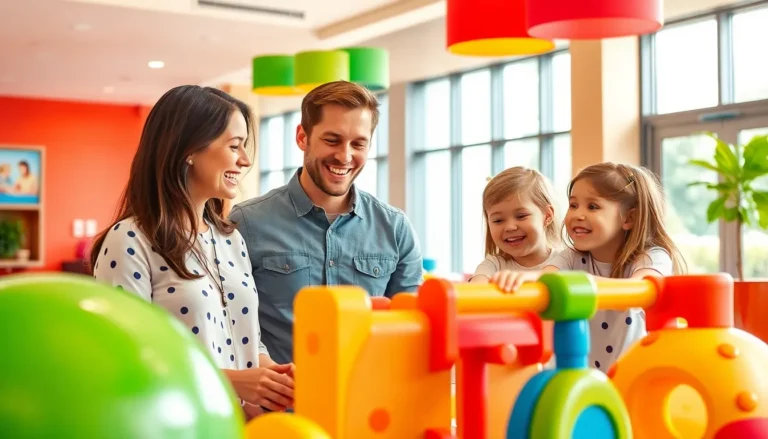Table of Contents
ToggleDivorce can feel like a dramatic plot twist in a soap opera, but when kids are involved, it’s more like a never-ending series of episodes. Co-parenting after divorce isn’t just about sharing the kids; it’s about navigating a new partnership filled with unexpected turns, awkward moments, and the occasional laugh. It’s not always easy, but with the right approach, it can be a rewarding journey.
Imagine turning those post-divorce challenges into opportunities for growth and connection. Co-parenting can transform from a daunting task into a cooperative venture where both parents work together to create a stable environment for their kids. With some humor and a dash of flexibility, co-parenting can become the best sequel to your family story—one where everyone thrives, even after the credits roll on the marriage.
Understanding Co-Parenting After Divorce
Co-parenting after divorce involves navigating new dynamics while prioritizing children’s well-being. This arrangement means parents share responsibilities and work collaboratively to provide a stable environment.
Definition of Co-Parenting
Co-parenting refers to the mutual involvement of both parents in raising their children post-divorce. It includes communication, decision-making, and planning for children’s needs. In effective co-parenting, both parents contribute to daily routines, education, and emotional support. Similar to partners in a business venture, these parents align their goals for their children’s growth.
Importance of Effective Co-Parenting
Effective co-parenting significantly impacts children’s emotional and psychological well-being. Children benefit from stable routines and consistent boundaries maintained by both parents. Research indicates that cooperative parenting can lead to better academic performance and social behavior in children. Children thrive when they see their parents work together harmoniously, fostering a sense of security. Furthermore, effective co-parenting reduces conflict, lessening stress for all family members involved.
Challenges of Co-Parenting After Divorce

Co-parenting after divorce presents various challenges that can affect both parents and children. Managing these difficulties requires patience and understanding.
Emotional Strain on Parents
Emotional strain often arises for parents navigating co-parenting. Stressful interactions may lead to frustration, anxiety or feelings of inadequacy. Parents can experience sadness over lost relationships and the changes in family dynamics. Complex decisions regarding children’s upbringing may further exacerbate these feelings. Effective communication becomes crucial in alleviating misunderstandings and aligning parenting strategies. Support systems, such as friends or family, provide essential outlets for sharing concerns. Seeking professional guidance might also help in addressing emotional challenges effectively.
Impact on Children
Children face unique challenges in co-parenting situations. Emotional turmoil can affect their behavior and mental health. Frequent transitions between households may create instability in routines. Educational performance may decline without consistent support from both parents. Positive engagement from both parents strengthens children’s emotional well-being. Stability in co-parenting reduces anxiety, helping children adjust to life after divorce. Open discussions about feelings foster trust and understanding for children, allowing them to express concerns. Involving children in age-appropriate decision-making can also empower them during transitions.
Strategies for Successful Co-Parenting
Successful co-parenting hinges on effective strategies that prioritize children’s well-being. These approaches create a supportive environment that fosters healthy relationships.
Establishing Clear Communication
Clear communication forms the backbone of successful co-parenting. Parents must discuss schedules, significant events, and children’s needs consistently. Utilizing tools like co-parenting apps improves organization and reduces misunderstandings. Each parent should remain respectful and open during discussions. Regular check-ins can address issues before they escalate. Focusing on the children’s best interests strengthens the partnership. Honest conversations about feelings contribute to better emotional health for everyone involved.
Creating a Parenting Plan
A comprehensive parenting plan outlines expectations and responsibilities. This document should detail custody arrangements, visitation schedules, and financial contributions. Both parents need to agree on key principles for discipline and education. Review the plan regularly, ensuring it adapts to children’s evolving needs. Clarity reduces confusion and helps maintain stability in children’s lives. Parents should also include provisions for conflict resolution, ensuring disputes are settled amicably. Keeping the plan accessible eases communication and reinforces commitment to co-parenting.
Resources for Co-Parents
Navigating co-parenting after divorce can benefit from various resources aimed at providing support and education. These tools help parents collaborate effectively and prioritize their children’s well-being.
Support Groups and Counseling
Support groups provide parents a safe space to share experiences. Access to these groups occurs through local community centers, online forums, or workshops. Many organizations offer professional counseling services tailored to co-parents facing challenges. Participation in these therapeutic sessions helps individuals address emotional struggles related to divorce. Listening to others enables parents to gain new perspectives and coping strategies. Programs like DivorceCare or local nonprofit services often facilitate meetings. Each meeting fosters community support and an understanding of shared experiences.
Educational Workshops
Educational workshops focus on enhancing parenting skills post-divorce. Many organizations, including schools and community centers, offer sessions that cover communication, conflict resolution, and child development. Instruction from professionals provides insights into effective co-parenting strategies. Attendees often learn about parenting plans and stress management techniques during these sessions. Taking part in workshops leads to improved interactions between co-parents. Engaging with experts allows for better understanding of children’s needs during transitions. Continuing education in this area helps parents evolve their approaches, paving the way for smoother co-parenting dynamics.
Navigating co-parenting after divorce can be challenging yet rewarding. By focusing on collaboration and communication parents can create a nurturing environment for their children. Embracing flexibility and humor helps in overcoming obstacles while fostering a sense of security for kids.
Utilizing resources like support groups and educational workshops enhances parenting skills and strengthens co-parenting dynamics. With a commitment to mutual involvement and understanding children’s needs parents can transform their co-parenting journey into a positive experience that benefits the entire family.







